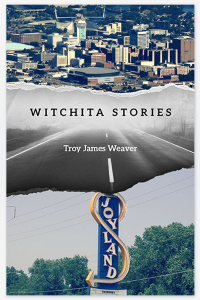200 pages, $12
Review by Ryan Werner
Previous general portrayal of the Midwest has been decidedly not-my-Midwest: Garrison Keillor’s rosy-cheeked shitheads and the good-guys-win-bad-guys-lose world of John Hughes. My Midwest is boredom and its trappings—drugs and sex and Tori Amos tapes—and as those ideas run through Troy James Weaver’s Witchita Stories, it does to Wichita, Kansas what Gummo did to sub-rural Ohio or what Alice Munro did to small town Canada. It shows how those not on the map survive without the map.
Opening jam “Summer” is the best of them all. It doesn’t go far, because nothing in town goes far. “My sister is sixteen and she’s already at that stage in life where she’s bringing over guys that look like Fonzie or Vanilla Ice.” That’s the first sentence, and I wish I had written it. I wish I had written the next part, too, about these guys and their bad music, their misappropriated styles. How the sister is distracted to a point of neglect and how hot it is outside and how you just won’t die one way or the other, won’t melt away in the heat and won’t freeze to death in counteracting it.
And that’s it. 329 words and maybe ten steps off the front porch, a walk into the kitchen to eat what your sister didn’t make you.
Weaver does the best thing a person can do when they won’t go anywhere else: he opens up his arms, pulls inward, and looks hard at what he’s grasped. This book is an arrangement of vignettes, the things that have stuck to his palms. Some are longer than “Summer” and some are shorter, but not by much on either side. In “Water Slides,” Weaver and his friend help fix up a buddy of theirs who had slit his wrists, thinking the whole time about the water park they get to go to the next day. How would the suicide attempt have been handled if they didn’t have the water park to look forward to? Would the story have been worth telling at all? It’s just a minor pause in the malaise, just like everything else, somehow.
There’s a small tribute of sorts to the BTK Killer, an undeniably exciting part of Wichita culture, and it’s around this point in the book where the length of the stories become part of the between-the-lines narrative of the book itself. Weaver spends just as much time talking about the BTK Killer as he does talking about this time some girl wanted to fuck him. That’s half as long as he spends on a girl whose pubic hair looked like Hitler’s mustache, twice as long as he spends on a former friend of his brother’s moving in with them and later on murdering someone. Convention, importance, influence. They all mean a different thing in this world.
If there’s a problem to be had with the book, it’s the perhaps-too-accurate feeling of the Midwest. I’ve spent most of my life living in towns of 2000 people. I know the feeling when Weaver’s stories come off as anecdotal, when the punch line and the setup to a joke are the same thing, when something promising cuts off abruptly. There’s a constant feeling of Well, I guess I’ll just go back to being alive, I guess.
Parts of Witchita Stories drag and some fall flat. Some hit the exposition too hard and there’s no real structure. It has other problems that those of us who have read a lot of books will find in almost any book that isn’t one of our sacred favorites. I could see how hearing this could deter you, but I say this for the same reason that Weaver put it all in there in the first place. It’s honest and it’s honorable. There are many great pieces to this book, and in telling the whole truth, they get that much greater.
In “Tennis Balls,” an old friend of Weaver’s dad gives Weaver a tennis ball. This old friend used to be a great jazz musician until he ended up drunk and homeless. Weaver kept the tennis ball a long time until it fell into a gutter. And that’s the whole story. There’s no fancy writer-tricks or English lessons. The tennis ball isn’t a metaphor and the homeless jazz musician is just that.
When they’re next to each other, we see my Midwest and possibly yours, too. How sometimes we fall apart and sometimes things fall apart for us. And how sometimes, nothing much happens at all.
***
Ryan Werner is a cook at a preschool in the Midwest. He plays a Kramer DMZ and an old Ampeg VT-22 in a loud instrumental rock band called Young Indian. You can find him online at www.RyanWernerWritesStuff.com and also @YeahWerner on Instagram.
![[PANK]](http://pankmagazine.com/wp-content/themes/pank/assets/images/pank-logo-large.png)

